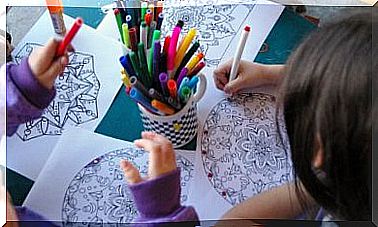Avoid Interrogating Your Teenager: Talk To Him

You come home from work and your partner starts asking, “How was your day? Did you manage to deliver that project? Did you postpone the meeting? Did you go to the supermarket after work?” It’s suffocating just to think about it, isn’t it? So why do we subject our children to this type of bombing? Interrogating your teenager will only increase the emotional distance between you and make communication difficult. Next, we’ll tell you why.
This is a mistake made by many mothers and many fathers, and it is understandable. We want to know if our children are doing well, if they have academic or social difficulties, and we want to know about the most important events of their day. Therefore, we started to interrogate them without taking into account that the location or form might not be the most suitable.
This can work when children are young, although it is still rare to get more than a simple, monosyllabic answer to get rid of the interrogation. However, by the time they reach adolescence, if communication is based exclusively on this type of one-sided dynamic, the adolescent will refuse to provide information.

Why should you avoid interrogating your teenager?
We often forget that our children, in addition to being our children, are also people. When we talk to a co-worker, a friend or a relative, we don’t resort to interrogation or demands. Likewise, if we want communication with our teenager to flow, we must treat them with respect and strive to establish a trusting relationship.
By interrogating your teenager, you are implying, in the first place, that you don’t trust him. You put yourself in a position of superiority that conveys that he must be accountable to you and that implies your desire to exert control over him, something that is generally unaccepted by young people of that age.
So, with this dynamic, you just ask, demand answers, and he just feels obligated to offer them. There is no dialogue, conversation or reciprocity. The relationship is more like that of a boss and an employee, or that of a policeman and a suspect, than that of two people who love, support, and accompany each other.
your child still needs you
Many parents think that interrogation, although not the best way to do it, is the only way to communicate with their children, to know what is happening in their lives. They claim that, since puberty, the young man has been distancing himself, isolating or focusing on his friends, and no longer sharing his private life with his parents.
In fact, adolescence represents an important paradigm shift. The family is no longer the center of the world for young people, and friendships and social circles with their peers take on a priority role.
However, this does not mean that adolescents do not need and do not want the advice, affection and support of their parents. Family relationships of affection and trust are very enriching and necessary throughout life and especially in a phase as complex and delicate as adolescence.
How to approach your teenager without questioning him?
So the question is, “How can I get close to my child without choking him with questions?” . The key is to strive to establish a loving, harmonious and healthy relationship. It would be very positive to start strengthening the bond from childhood, but it is never too late to start or change the way you educate.

So, first of all, you must always be willing to listen. Sometimes, spontaneously, your child will want to share their experiences with you or will need your advice. Pay attention to these moments, dedicate your five senses to him and show that he can count on you.
On the other hand, be sure not to judge him or lecture him when he opens up. If he comes to you with a problem or question and you blame him for his bad behavior or bad decision making, he will shut down and will likely avoid communicating with you next time. Advise him, yes, but don’t judge. Give your support.
Finally, it is important that communication is natural and bidirectional. In other words, open yourself to your child, talk to him about his childhood or what happens in his daily life. Share your experiences and emotions with him so that he feels that it is reciprocal, that the trust is mutual. This will be extremely enjoyable and enriching for both of them.









